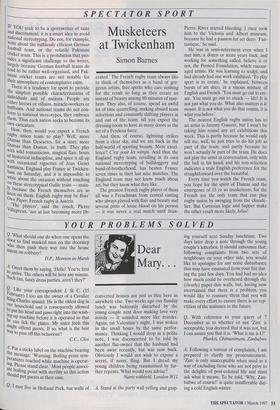SPECTATOR SPORT
IF YOU seek to be a sportswriter of taste and discernment, it is a smart idea to avoid national stereotyping. Do not, for example, Write about the ruthlessly efficient German football team, or the volatile Pakistani cricket team. This is a prohibition that pro- vides a significant challenge to the writer, largely because German football teams do tend to be rather well-organised, and Pak- istani cricket teams are not notable for their atmosphere of contemplative calm. There is a tendency for sport to provide the simplest possible characterisations of individuals and of nations. People are either heroes or villains, miracle-workers or buffoons. And national teams do not con- form to national stereotypes, they embrace them. Thus each nation seeks to become its own caricature. How, then, would you expect a French rugby union team to play? Well, more Dumas than Descartes, for a start; more Dumas than Dumas, in truth. They play With wild romanticism, magical flair, bouts of hysterical indiscipline, and spice it all up With occasional vignettes of Jean Genet nastiness. England play France at Twicken- ham on Saturday, and it is impossible to write about the occasion without touching on these stereotypical Gallic traits — main- ly because the French themselves are so keen on them. English rugby may be Boys' Own Paper; French rugby is Asterix. The players', said the coach, Pierre v dlepreux, 'are at last becoming more lib-
Musketeers at Twickenham
Simon Barnes
erated.' The French rugby team always like to think of themselves as a band of gor- geous artists, free spirits who care nothing for • the result so long as they create an instant of beauty among 80 minutes of may- hem. They also, of course, spend an awful lot of time quarrelling, making absurd team selections and constantly shifting players in and out of the team, till you expect the dressing-room to have as many doors as the set of a Feydeau farce.
And then, of course, lightning strikes from a clear sky, and we are back in the half-world of sporting beauty. Mere excel- lence? C'est pour les wimps. And thus the England rugby team, revelling in its own national stereotyping of bulldoggery and band-of-brotherhood, has beaten France seven times in their last nine matches. The England team may not know much about art, but they know what they like.
The greatest French rugby player of them all was a Frenchman from central casting who always played with flair and beauty and several pints of loose blood on his person — it was never a real match until Jean- Pierre Rives started bleeding. 1 once took him to the Victoria and Albert museum, because he had a passion for art deco. Tan- tastique,' he said.
He was in semi-retirement even when I met him, a dozen or more years back, and working for something called, believe it or not, the Pernod Foundation, which encour- aged artists. He was learning to sculpt, and had already had one work exhibited. 'To play sport is to create,' he explained, between bursts of art deco, in a vinous mixture of English and French. 'You must go out to cre- ate. You must go out to attack — life! It is not just what you do. What also matters is le moyen. It is not what you do that counts, it is what you believe.'
The nearest English rugby union has to an artist is Jeremy Guscott, but I won't be taking him round any art exhibitions this week. This is partly because he would only tell me, well, he just tries to do his job as part of the team, and partly because he won't actually be part of the team, He does not play the artist in conversation, only with the ball in his hand; and his non-selection indicates a truly English preference for the straightforward over the beautiful.
Every time you watch the French team, you hope for the spirit of Dumas and the emergence of 15 or so musketeers, for the French are the only team that can play rugby union by swinging from the chande- lier. But Cartesian logic and Sapper make the other result more likely, helas!


























































 Previous page
Previous page